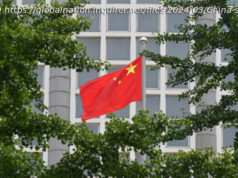“Be cool, it will all work out!”
There’s a strategy here, I think, but hoo boy is it weird watching President MAGA tweet about the importance of saving Chinese jobs. Especially when those jobs are at a telecom company which has been accused repeatedly of acting as a surveillance arm of the Chinese government. Members of Congress have been calling ZTE a national security threat since the end of Obama’s first term. The Pentagon has banned military bases from selling the company’s phones and U. S. intel honchos publicly warned American citizens against using them a few months ago.
Now here’s Trump, the great protectionist, a man who was threatening China with $100 billion in new tariffs five weeks ago, worried about ZTE’s future.
Out: Trump is colluding with Russia. In: Trump is colluding with China.
President Xi of China, and I, are working together to give massive Chinese phone company, ZTE, a way to get back into business, fast. Too many jobs in China lost. Commerce Department has been instructed to get it done!
— Donald J. Trump (@realDonaldTrump) May 13,2018
China and the United States are working well together on trade, but past negotiations have been so one sided in favor of China, for so many years, that it is hard for them to make a deal that benefits both countries. But be cool, it will all work out!
— Donald J. Trump (@realDonaldTrump) May 13,2018
Pithy background: Last year the Commerce Department accused ZTE of defying U. S. sanctions on North Korea and Iran by doing business with those two countries under the radar. They slapped a fine of more than a billion dollars on the company and reached a settlement with it in which ZTE agreed to take certain disciplinary measures against employees responsible for breaking the sanctions. Failure to comply would mean the U. S. could bar the company from importing American tech components on which its business relies for seven years. Last month Commerce announced that they’d discovered that not only had ZTE not disciplined the employees, eschewing even letters of reprimand, they paid them bonuses. Citing the settlement agreement, Commerce Secretary Wilbur Ross declared that the seven-year ban barring ZTE from U. S. exports was now in effect.
And that was a heavy blow. ZTE might not be able to continue operations without the components. It’s not the biggest Chinese telecom company but it still commands 75,000 employees. And the company that *is* the biggest, Huawei, now has something to fear:
Before Trump’s tweet, the administration’s move against ZTE carried the implied threat of an even more damaging assault. The United States has also been investigating Huawei, ZTE’s much larger Chinese rival, for a similar set of alleged sanctions violations. “Much larger than ZTE and far more critical to China’s industrial policy plans, Huawei could be a much more significant chip in trade negotiations,” the New York Times’s Paul Mozur and Raymond Zhong write. And the penalty against ZTE suggested Huawei could be next. “While the sanctions at present are limited to ZTE, there is the obvious prospect/risk that similar sanctions ultimately will be imposed on Huawei,” Cowen Research Group’s Paul Silverstein wrote in a note last month.
It’s not just the economic fallout that makes sanctions on ZTE and possibly Huawei so painful for China. Nationalist politics matter here too — on both sides:
America’s ability to cripple the company simply by freezing its access to components made in the United States is a stark sign of what Beijing views as its overreliance on American technology. Pardoning a company that failed to punish employees who violated American trade controls against Iran and North Korea would set a difficult precedent for the United States…
In reality, ZTE represents much more to China than merely jobs. As a maker of the equipment that undergirds cellular networks, the company plays a crucial role in China’s innovation drive and its push to influence technology outside its borders.
Now you can see what Trump’s doing, or trying to do, with his tweets. American and Chinese negotiators have been meeting regularly for weeks to try to avert the trade war that (nearly) broke out last month. The Chinese obviously want the export ban on ZTE and, especially, the potential ban on Huawei to be on the table as part of any grand bargain on trade. They’ve mentioned that to Ross in negotiations too — but Ross said no, whether because he’s driving a hard bargain or because he genuinely believes that the Chinese shouldn’t be able to negotiate their way out of sanctions-busting vis-a-vis two U. S. enemies like North Korea.
The tweets are Trump’s way of going over Ross’s head and signaling to the Chinese that they *can* negotiate their way out of the ZTE export ban, depending upon what they’re willing to give up. A new round of trade talks begins this week; POTUS is adding these major new concessions to the mix in hopes of enticing the Chinese to add their own. Hopefully he’s coordinating with Ross on that, a sort of good cop/bad cop play for leverage in which Trump signals he’s open to anything while Ross plays hardball at the negotiating table. But Trump being Trump, you never know. Remember, he reportedly agreed to the idea of a summit with Kim Jong Un without consulting his natsec or diplomatic teams first. Maybe a high Chinese official reached out to him to lobby him personally on ZTE and Trump was responsive, knowing that Chinese cooperation will also be useful with whatever comes next on North Korea. He might be hanging Ross out to dry.
Either way, it’s really weird to see those tweets, not just because of his trade saber-rattling on China or because he’s undercutting his Commerce chief but because he’s potentially also undercutting U. S. sanctions on the NorKs and Iran. If ZTE gets relief, it’ll prove that offenders can “buy” their way out of doing business with bad guys. The fact that ZTE *itself* is deemed a national security threat compounds the weirdness, as critics on the right and the left are reminding him:
Problem with ZTE isn’t jobs & trade, it’s national security & espionage. Any telecomm firm in #China can be forced to act as tool of Chinese espionage without any court order or any other review process. We are crazy to allow them to operate in U. S. without tighter restrictions https://t.co/AXtTDgufc9
— Marco Rubio (@marcorubio) May 14,2018
Our intelligence agencies have warned that ZTE technology and phones pose a major cyber security threat.






